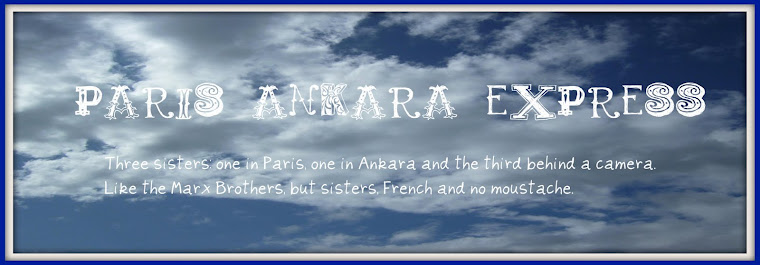'Do you know the way to Pancarlik church from here? No, we don't have a car. We want to walk in the valley.'
We get directions. In Turkish, of course. We check which of us have understood. It doesn't matter much what I understood as I can't so much as tell my left from my right most of the time. There's a hamam involved, the back of a castle, and you should take the little path to the right (or left?) not go straight down the valley to Urgup. Oh yes, and it's six kilometres.
We take our time to leave the castle top cafe, giving the patron just enough time to bring his friend who knows the region like the back of his hand. He explains in a bit more detail (turn right at the hamam, and walk till you see the back of that castle and then go down to the valley). We're still not convinced we're going to make the 6km walk without getting lost. I joke to our minibus driver that if we're not at Pancarlik in 3 hours he should send the helicopters. We grab our coats and look in the direction we're supposed to go (we think). And then, just in time, the guy from the cafe is here and he offers to guide us. It's a good price. And he'll take us to a church on other side of the valley first. He assures us he'll take it slow, for the children. Off we go.
The church is amazing. And we wouldn't have found it without him. You have to climb up a stiff side to see it's here, even. And it's not in either of our guides.
He's giving us all a hand on the difficult passes, and carries Charlotte's bag.
It's beautiful.
Then it's down again, and in the opposite direction.
Within a hundred yards, we freeze. Standing before us, are six horses, and two dogs. The horses are about to be mounted by a small tribe of French people in full horse-riding attire. Some of them are very young - younger than Max. Their beige trousers and black jackets look incongruous in the wild and muddy landscape. We freeze - Max screams.
I don't have much time to explain. I tell the man: he's autistic, and he's really scared of animals. Especially dogs. But horses too. The man nods and picks Max up. You're going on my shoulders, he says. You'll be fine. Max screams again a bit when we cross the area where the horses and dogs are. One child holds a dog, and a woman tells him to move it out of our way. Another woman tells Max not to scream. I tell her he's autistic and scared. I don't know if she's convinced, but she shuts up.
And then we're through. Max is calm. He comes down. He and the guide chat for a bit. Then the guide asks me why Max is afraid. Is it an allergy? Has he been hurt by a dog or a horse before? I say he's autistic. Then, as it doesn't seem to mean anything to him, I try to explain, in my skeletal Turkish. It's a mental condition. It means he has communication problems, speech problems, and he has phobias. He nods. That'll do.
We trudge on for six kilometres. jumping over the river every five minutes or so to get to the less muddy side. It's a bit cold, but after a while we still have to peel off a layer or two. The landscape is amazing.
The children are used to long walks, and they're mostly enjoying it. When Max gets tired, our guide carries him. Or he races him and then they sit down to wait for us. When they sit, I notice that he puts his hands on Max's head very firmly, the way Max prefers to be touched, the way that calms him. The way you're supposed to touch animals, and especially horses to reassure them. Very quickly, the two develop a rapport. For the entire walk, they're together.










